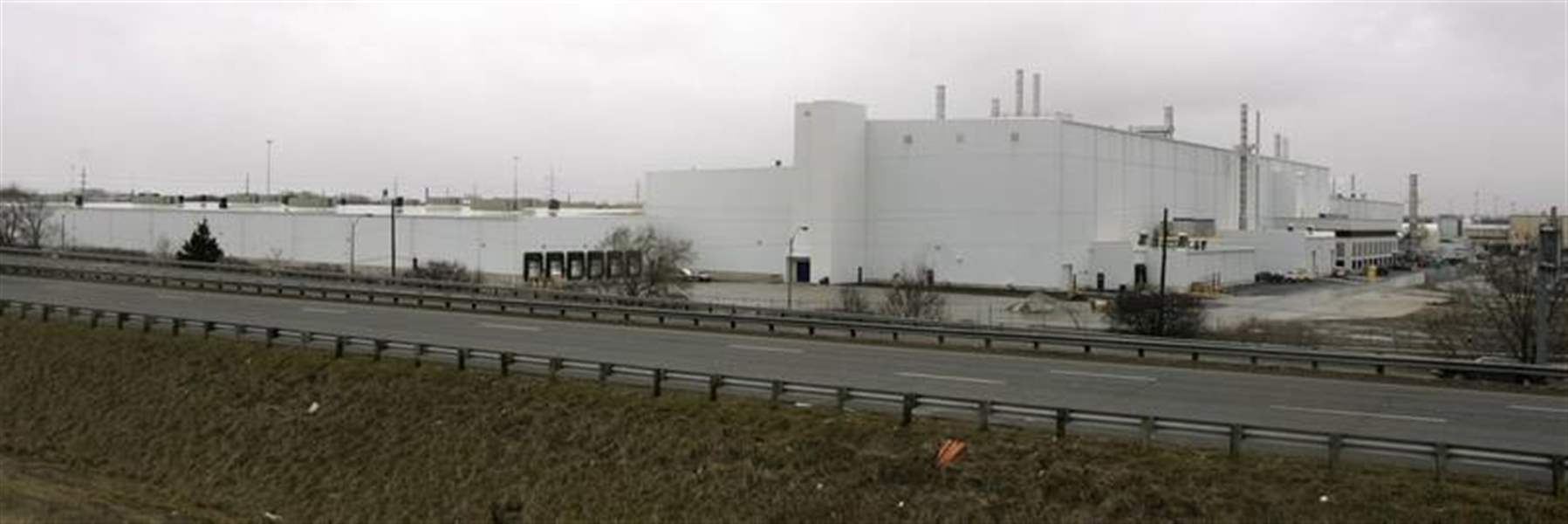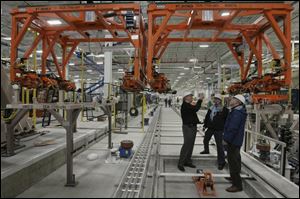
Industry watches as Jeep transfers tasks to suppliers
1/8/2006
The Toledo Jeep Assembly plant, with four connected factories, each with a different owner, will be assessed by other automakers.

Plant officials, from left, Steve Azoni, Ted Roberts, and Dave Elshoff examine part of a new addition at Toledo Jeep Assembly, where new Wranglers will undergo final assembly.
Two suppliers this year will take over key tasks in making Jeep Wranglers in Toledo, leaving DaimlerChrysler AG to do final assembly of the redesigned icon.
A Michigan company plans within two years to take that process a step further, handling complete assembly of lower-volume vehicles for various automakers. A couple of European companies are exploring options too.
But whether these are indications that automakers someday will no longer manufacture vehicles they design and sell or whether these are simply helpful steps toward easing their financial burdens is uncertain. The Big Three, experts said, will continue vehicle assembly at least for the next several years.
It s a tough job right now for [suppliers] to make that sell, said Brett Smith, an assistant director at the Center for Automotive Research in Ann Arbor.
Still, a historic labor contract with the United Auto Workers Local 12 in Toledo brings to the fore the issue of suppliers making more of the cars, sport utility vehicles, and trucks Americans drive than ever before.
If this turns out to be the success we think it will be it ll probably be the new model for the industry, said Bruce Baumhower, Local 12 president.
At a time the U.S. auto industry was feeling bloated from too many assembly plants and car sales had to be propped up with hefty incentives, Chrysler and Local 12 signed a historic deal.
To gain a $2.1 billion investment and to assure Toledo Jeep Assembly would make four vehicle models instead of two, the union said suppliers could staff factories at a complex that would build and paint vehicle bodies before final work is done by Chrysler employees. Supposedly, overall employment at the complex would be roughly the same as before.
Such on-site supplier factories performing key work previously done by autoworkers is unprecedented in North America.
At the time, in 2003, local UAW officials and auto industry experts said the agreement and setup at Toledo Jeep could become a model in the industry. So far, though, similar arrangements have not spread, and Chrysler has not tried it at other U.S. assembly plants it is refurbishing.
Assessing the results
The North Toledo Jeep complex, with four connected factories each with a different owner, will be assessed by other automakers, said Greg Gardner of Harbor Consulting in Troy, Mich.
It s something that competitors will be looking at closely, he said. It s a credit to both management and the UAW that they ve been able to be this adventurous.
Devoted Wrangler customers also will be watching.
Repeat Wrangler owner Ken Fidler of Streamwood, Ill., who recently purchased a 2005 Jeep Wrangler Unlimited Rubicon, said he is aware of such setups overseas and knows outsourcing has become more common in North America.
But he said he has concerns about quality and reliability, as well as whether the Wrangler s price will increase and development of pickups or other models will be stunted because more companies are involved.
Hopefully Jeep is still in the driver s seat and calling the shots, Mr. Fidler said. Having the suppliers right there instead of in another country or even another town is a big plus, so issues should be resolved quickly.

The Toledo Jeep Assembly plant, with four connected factories, each with a different owner, will be assessed by other automakers.
At Toledo Jeep, Kuka Group of Germany will build bodies for two-door and four-door versions of the redesigned Wrangler, and Haden International Group Inc. of Michigan will paint them. A third supplier, Hyundai Mobis of South Korea, will build the Wrangler chassis, a chore not currently done at Toledo Jeep. Production is to start in July.
The complex replaces an aging Wrangler factory arrangement, which Chrysler threatened to fix by moving the work to lower-cost Mexico until the innovative labor pact was sealed.
A major test
The relationship among Chrysler and the suppliers will be a major test, said John W. Henke, Jr., president of Planning Perspectives Inc. in Birmingham, Mich.
Chrysler has lowered its investment cost by pulling in suppliers, and there needs to be trust among them, he said.
The suppliers, Chrysler, and Local 12 all have to work together, Mr. Baumhower said. If anybody can make it successful, it s the Jeep workers who can do it, he said.
Michigan s ASC Inc. is one supplier ready to forge much closer ties with automakers. It is not involved at the Toledo Jeep complex but plans to pick a factory site this year and is talking to carmakers about manufacturing niche vehicles.
The Southgate, Mich., supplier of roof systems and other parts proposes building vehicles with volumes of 5,000 to 20,000 units each a year for a total of 50,000 units, or roughly half of last year s Wrangler output.
It would employ up to 800 workers on two shifts and use fewer robotics than a traditional auto plant, cutting down on the cost of investment, company spokesman Tim Yost said.
We try to do it a little cheaper and to be a lot more flexible, he said.
Such supplier assembly work would mean lower fixed costs for traditional automakers, which no longer would need as much factory capacity or as many workers, who typically make $10 to $15 an hour more than the average supplier employee wage.
Companies such as ASC will need multiple low-volume contracts to make money, said Mr. Gardner of Harbour Consulting.
In Europe, most contract work done for automakers is overflow capacity, and the Big Three have more than enough North American factory space available, Mr. Gardner said. A German supplier, Karmann, builds all Chrysler Crossfires in Europe, and the sports cars are shipped to the United States for sale.
The recently released Pontiac Solstice would have been a natural choice for a contract manufacturer, but General Motors Corp. had available space and workers in Wilmington, Del., and put the low-volume convertible there, said Mr. Smith of the Center for Automotive Research.
UAW workers for the Big Three receive 95 percent of take-home pay when they are idled, providing an incentive to keep such work, he said.
Why would you let ASC build the car when you ve got an empty plant there and workers you pay? Mr. Smith said.
The Michigan supplier s most advanced project is with GM, providing 42 major vehicle subassemblies for the Chevrolet SSR roadster-pickup, managing more than 90 percent of the vehicle s content. GM, though, is scheduled to shutter the SSR s Lansing factory this summer.
Maintaining control
Among other potential candidates for contract work, Toyota Motor Corp. and Honda Motor Co. are committed to keeping control over assembly work and have the resources to build plants, Mr. Smith said. Both also have close Japanese partner companies that would likely be chosen to do any contract manufacturing there, he said.
Of the Asian automakers, Nissan Motor Co. seems most willing to share work with suppliers, Mr. Gardner said. Still, while its factories in Mississippi and Tennessee have suppliers on site building dashboards and other vehicle sections, they have not taken over final assembly jobs, he said.
The idea of North American suppliers building entire cars could work in time, Mr. Gardner said.
Someday we ll see it, but right now there are a lot of factors that are working against it, he said.
Contact Julie M. McKinnon at: jmckinnon@theblade.com or 419-724-6087.